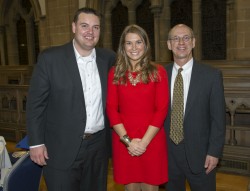
Two third-year law students at Drake Law School represented the United States in the Louis M. Brown and Forrest S. Mosten International Client Consultation Competition this spring. Katheryn Thorson and Nathan Borland were named national champions at the American Bar Association (ABA) Client Counseling Competition at Baylor University in March, an achievement that landed them the opportunity to represent the United States at the international competition at the University of Glasgow in Scotland. Thorson and Borland beat Villanova University and Samford University for the national title. At the international competition, Thorson and Borland competed against 20 teams from around the world.
The ABA Client Counseling Competition and the International Client Consultation Competition simulate a law office consultation. Unlike a mock trial competition or appellate advocacy competition, the students do not know the facts of the case in advance of the competition. Students interview a client (an actor provided by the host school), ask questions to learn the nature of the client’s problem, and then help the client think through possible solutions. Competitors are required to build rapport and develop strategy on the spot.
“I think in order to succeed in this type of competition you have to know how to deal with clients,” says Nathan Borland. “Drake focuses on training students in a practical way. We have opportunities as Drake students to actually practice law thanks to the Drake Legal Clinic and the great relationships our school has with practitioners in Des Moines. We weren’t trying to play the role of attorney at the competition; we were just being ourselves.”
A total of 138 teams from law schools across the country entered the ABA competition, but only 12 teams advanced to the national finals. Drake University has made it to the national finals three times since 2005, but this marked the first national title for Drake.
“The students know the client’s problem has something to do with a particular area of law, but they don’t know the exact problem,” says Matthew Doré, faculty coach for the competition. “The judges are testing their ability to ask questions, make the client feel comfortable, and establish rapport, as well as their ability to bring the client’s problem to the surface.”
Thorson and Borland spent months preparing for the competitions by studying employment law, which was the topic for both the regional and national competitions. For the international competition in Scotland, however, the topic was criminal law. Thorson and Borland did well, making it to the semi-final rounds against Scotland and England.
Competing internationally would not have been possible without the support of alumni and local volunteers. The students prepared by conducting practice consultations with volunteer clients and local lawyers. Many law students, faculty, staff, and local practitioners helped Thorson and Borland prepare for the competition and thus share credit in the team’s success.
Additionally, the team would not have been able to travel to the international competition without the financial support of alumni. Doré says the team had less than two weeks to pull together funding to send Thorson and Borland to the competition. Fortunately, alumni rallied and raised the necessary funds.
“My experience in Scotland was incredible,” says Thorson. “I had the opportunity to interact with people from all different backgrounds and cultures, and it put my communication skills to the test. I know both Nate and I were grateful for the opportunity to not only represent Drake but to represent the entire United States. It was a great honor.”

